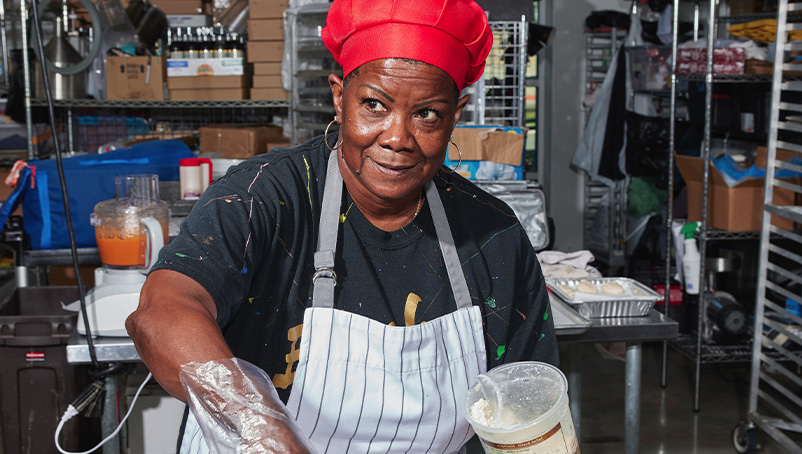Ensuring food safety and quality is one of the key ingredients in the food and beverage business. That's why food manager certification can be a huge asset for your restaurant, cafe, coffee shop, bakery, catering company or other food business. While not every state requires food safety certification, most want businesses to have a certified food protection manager (CFPM) on staff.
Grab a cup of coffee (or maybe a fork!) to learn what food manager safety certification is, why it's important, and the many benefits of having a certified professional on your team.
Jump ahead to learn:
- What is food manager certification?
- Who needs the food manager certification?
- How to get food manager certification
- How long does food manager certification last?
- Food safety manager requirements by state
- How NEXT helps protect your food service business
What is food manager certification?
A food manager certification is essential for anyone who works with food and drinks. Also known as a food protection manager or a person in charge (PIC), it serves as proof that a staff member has the training to understand and follow food safety regulations and guidelines.
There’s a difference between food manager certification and a food handler license. Although some states may consider food manager certification optional, they may still require a food handler license. Ensure your staff members have these certifications to show customers that you take their safety seriously and that you’re committed to safe, high-quality food.
Who needs the food manager certification?
If your state mandates it, almost every food business will need someone with a food service manager certification on-site at all times during operation. If you're a sole proprietor it's up to you to earn the certification and adhere to health regulations.
Some exceptions to this requirement exist. You may be exempt if:
You operate a convenience store.
You exclusively prepare, service, or sell commercially processed or pre-packaged time/temperature-exempt foods.
How to get food manager certification
To get a food safety manager certification, you must pass a training program and exam that tests in-depth knowledge of food safety topics such as:
- Foodborne illness and prevention.
- Personal hygiene procedures.
- Food preparation and cross-contamination guidelines.
- Cleaning and sanitizing equipment and utensils knowledge.
- An understanding of food safety problems and food allergy prevention.
Your local jurisdiction might also have its own food safety exam requirements. Many areas accept certificates from training programs like ServSafe, the Certifying Board for Dietary Managers (CBDM), AAA Food Handler, and the American National Standards Institute – Conference for Food Protection (ANSI-CFP).
Food manager certification costs
The fee for a food service manager certification varies depending on the training provider and location. Online training and in-person courses can cost between $75 and $150.
As a restaurant owner, you don’t have to cover the course or exam cost. However, the investment is well worth it. A certified food manager can help prevent foodborne illnesses, avoid costly fines and provide customers with safe dining experiences.
Food safety manager requirements by state
Ensuring food safety is essential for any restaurant owner. That's why it's important to know your state's food safety requirements. Regulations can change, so it's always a good idea to check with your local health department or state agency for the most up-to-date requirements.
|
State |
Statewide mandate (Source: ServSafe) |
Jurisdiction |
|
Yes |
||
|
Alaska |
Yes |
|
|
No |
||
|
Arkansas |
Yes |
|
|
Yes |
||
|
Colorado |
Yes |
|
|
Connecticut |
Yes |
|
|
Delaware |
Yes |
|
|
Yes |
||
|
Georgia |
Yes |
|
|
Hawaii |
Yes |
|
|
Idaho |
Yes |
|
|
Yes |
||
|
Indiana |
Yes |
|
|
Iowa |
Yes |
|
|
Kansas |
Yes |
|
|
Kentucky |
Yes |
|
|
Louisiana |
Yes |
|
|
Maine |
Yes |
|
|
Maryland |
No |
|
|
Massachusetts |
Yes |
|
|
Michigan |
Yes |
|
|
Minnesota |
Yes |
|
|
Mississippi |
Yes |
|
|
Missouri |
No |
|
|
Montana |
Yes |
|
|
Nebraska |
No |
|
|
No |
||
|
New Hampshire |
Yes |
|
|
New Jersey |
Yes |
|
|
New Mexico |
Yes |
|
|
New York |
Yes |
|
|
North Carolina |
Yes |
North Carolina Department of Agriculture and Consumer Services |
|
North Dakota |
No |
|
|
Ohio |
Yes |
|
|
Oklahoma |
No |
|
|
Yes |
||
|
Pennsylvania |
Yes |
|
|
Rhode Island |
Yes |
|
|
South Carolina |
No |
South Carolina Department of Health and Environmental Control |
|
South Dakota |
Yes |
|
|
Tennessee |
Yes |
|
|
Yes |
||
|
Yes |
||
|
Vermont |
Yes |
|
|
Virginia |
Yes |
|
|
Yes |
||
|
Washington, D.C. |
Yes |
|
|
West Virginia |
Yes |
|
|
Wisconsin |
Yes |
Wisconsin Department of Agriculture, Trade and Consumer Protection |
|
Wyoming |
No |
How long does food manager certification last?
While certifications are generally good for three to five years, rules and regulations can change. Check with your local health department or food safety authorities for the most accurate and current information.
The validity of food protection manager certification varies from state to state. For example, a food manager certificate in California and Texas is valid for five years, while one from Baltimore, Maryland expires after three years.
How NEXT helps protect your food service business
NEXT has served over 10,000 food businesses with tailored, accessible and always-on restaurant insurance, catering insurance, coverage for bakeries, and insurance protection for cafes and coffee shops.
Get just the right amount of food and beverage business insurance, such as general liability, workers’ compensation and commercial property insurance. Customize and combine policies based on your business' unique risks.
Get a free quote and buy coverage in under 10 minutes. Access your policy, file a claim, and get an instant certificate of insurance 24/7.
Start a free quote with NEXT.





